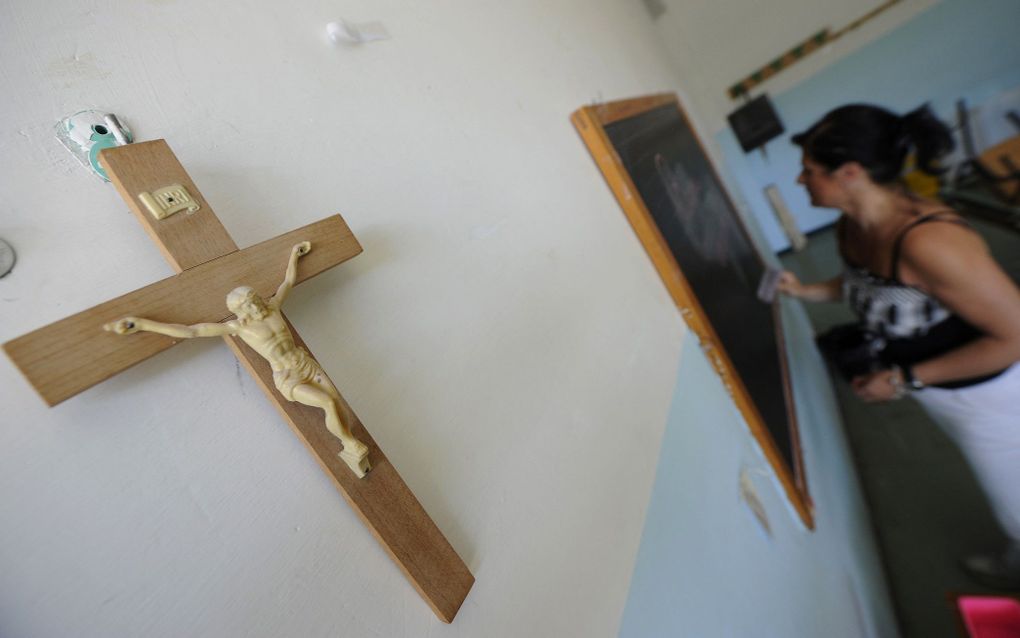Weekly column from Italy: Religious freedom in Italy’s public school

A crucifix is seen on a wall as a teacher writes on a blackboard in a classroom in Viterbo in Italy. Photo AFP, Tiziana Fabi
Christian Life
I am a mom now, with a daughter attending the Italian public school. And now I realise that some things have never changed since I attended myself.
When I was a kindergartener and elementary school child, I spent many, many hours during the religious education in the school hallways together with a few teachers who would take the opportunity to drink coffee and relax. All this happened in IRC hours, when the Catholic Religion was taught to students. In middle and high school, I always stayed in class because there was no curriculum for me, and I was old enough to decide to study other things. Today, my daughter attends public kindergarten. As the law provides, we decided to not to have her join the “teaching of IRC”. At the same time, it is very difficult to understand what the school really offers as an alternative during the hours when Catholic Religion is taught in the classroom.
Tradition
We are not the only family that is confronted with this problem. In fact, there are many complaints like these that come to the Italian Evangelical Alliance's Religious Liberty Commission. But it is not easy to succeed in changing such a long tradition.
“The Catholic religious hour” exists because in 1929, the Fascist regime signed a Concordat with the Vatican. Among other things, it provided for the introduction of compulsory Catholic religious instruction from kindergarten through high school. In 1984, the Concordat was revised and since then it has stated, "The Italian Republic, recognising the value of religious culture and taking into account that the principles of Catholicism are part of the historical heritage of the Italian people, will continue to ensure, within the framework of the purposes of the school, the teaching of the Catholic religion in non-university public schools of all levels."
Since then, one and a half hours of teaching have been provided in kindergarten, two hours per week in elementary school, and one hour in middle and high school.
Discretion
The law says IRC "shall be taught in conformity with the doctrine of the Church." This means that by law, the hour is used to teach specifically the Roman Catholic doctrine. Moreover, teachers of these classes take a completely different path than others. In fact, they are not hired by the schools through a public competition like others, but are chosen by the Curia at its sole discretion.
So, the state pays salaries to people over whom it has no control whatsoever, and who use the space granted for biased teaching, often contrary to the secular principles of the state itself. Moreover, only the Curia can choose to suspend a teacher for reasons of moral conduct, and the state has no power.
The law is very clear in saying that the Catholic religion hour is optional for students. There are three options to skip the religious classes:
Attend educational and training activities (so-called "alternative hour").
Dedicating the hour to the study of other subjects. Here, too, resistance may arise, but the school is obliged to ensure a teacher and a classroom suitable for the purpose.
Staying at home during the IRC hours.
For each of these possibilities, families actually find many problems. Often the "alternative hour" does not have a defined and clear program. Sometimes it is not really followed.
For the study of other subjects, there is often a lack of available support teachers, or empty classrooms to go to. Children often stay in the classroom while the religion teacher does his or her lesson. Formally, they may not attend class, not have their books, or do their homework, but they witness teaching that their parents did not want them to attend.
For out-of-school time, the religion class should take place as the first or last hour to benefit families. However, this is often not the case. And it is hard for families to pick their children up from school during school hours and drop them off again, especially when parents work.
In short, freedom of choice exists in theory. But in practice, it is very difficult to achieve.
Freedom
Half of the students in my daughter's class are Muslim. At our first meeting with the teachers, we tried to figure out how religious classes worked. However, the answers were very vague. One of the responses that schools now always give: "In any case it will not be denominational teaching. We talk about religions in general."
This sounds like an inclusive answer, but in practice, it infringes on the freedom of those who believe that it is the family that should provide the teaching of religion, whatever it may be, and that the public school cannot enter such a sensitive area of children's and families' lives.
I hope to see my daughter follow a viable alternative program when she is older instead of wasting time in the hallways watching teachers sipping coffee as I did for so many years.
Chiara Lamberti (1992) was born and raised in Naples, Italy. She studied Communication Sciences and has a master's degree in Information, Publishing and Journalism. She also has a degree in theology. She writes for the Italian Evangelical Alliance and contributes to the Protestant magazine Loci Communes. With her husband, daughter and son, she lives in Rome.
Related Articles






